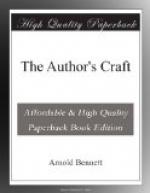The classic modern example of the tragedy of the artist who repudiates the world is Flaubert. At an early age Flaubert convinced himself that he had no use for the world of men. He demanded to be left in solitude and tranquillity. The morbid streak in his constitution grew rapidly under the fostering influences of peace and tranquillity. He was brilliantly peculiar as a schoolboy. As an old man of twenty-two, mourning over the vanished brio of youth, he carried morbidity to perfection. Only when he was travelling (as, for example, in Egypt) do his letters lose for a time their distemper. His love-letters are often ignobly inept, and nearly always spoilt by the crass provincialism of the refined and cultivated hermit. His mistress was a woman difficult to handle and indeed a Tartar in egotism, but as the recipient of Flaubert’s love-letters she must win universal sympathy.
Full of a grievance against the whole modern planet, Flaubert turned passionately to ancient times (in which he would have been equally unhappy had he lived in them), and hoped to resurrect beauty when he had failed to see it round about him. Whether or not he did resurrect beauty is a point which the present age is now deciding. His fictions of modern life undoubtedly suffer from his detestation of the material; but considering his manner of existence it is marvellous that he should have been able to accomplish any of them, except Un Coeur Simple. The final one, Bouvard et Pecuchet, shows the lack of the sense of reality which must be the inevitable sequel of divorce from mankind. It is realism without conviction. No such characters as Bouvard and Pecuchet could ever have existed outside Flaubert’s brain, and the reader’s resultant impression is that the author has ruined a central idea which was well suited for a grand larkish extravaganza in the hands of a French Swift. But the spectacle of Flaubert writing in mots justes a grand larkish extravaganza cannot be conjured up by fancy.
There are many sub-Flauberts rife in London. They are usually more critical than creative, but their influence upon creators, and especially the younger creators, is not negligible. Their aim in preciosity would seem to be to keep themselves unspotted from the world. They are for ever being surprised and hurt by the crudity and coarseness of human nature, and for ever bracing themselves to be not as others are. They would have incurred the anger of Dr. Johnson, and a just discipline for them would be that they should be cross-examined by the great bully in presence of a jury of butchers and sentenced accordingly. The morbid Flaubertian shrinking from reality is to be found to-day even in relatively robust minds. I was recently at a provincial cinema, and witnessed on the screen with a friend a wondrously ingenuous drama entitled “Gold is not All.” My friend, who combines the callings of engineer and general adventurer with that of serving his country,




